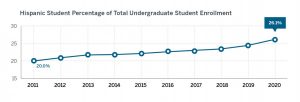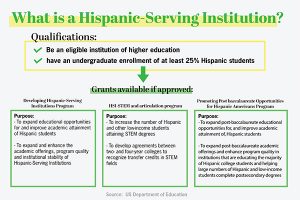UT-Austin to create Alliance of Hispanic Serving Research Universities with 19 other schools
June 20, 2022
UT is joining 19 other leading research universities to form the Alliance of Hispanic Serving Research Universities and foster a greater representation of Hispanic students in doctoral studies.
The alliance hopes that by promoting Hispanic representation in higher education, it can help create a workforce that is more reflective of the demographics of the U.S. by 2030, according to a UT News release. The two main goals of the alliance are to double the amount of Hispanic doctoral students at member universities and to increase the Hispanic professoriate at these universities by 20%, according to the news release.
“The thing that makes this group different is that we are all class one research universities,” said Heather Wilson, president of UT-El Paso and chair of the alliance. “We have research capacity and the ability to impact doctoral degree students and the future faculty more than anyone else.”
A university must be a Hispanic Serving Institution, as well as an R1 research university, to qualify for the alliance. To be a Hispanic Serving Institution, at least 25% of undergraduate students must be Hispanic according to the U.S. Department of Education. UT-Austin met these qualifications in 2020. Out of the 20 universities involved in the alliance, four of them are in the UT System — including UT-Austin, UT-El Paso, UT-Arlington and UT-San Antonio.
Wilson said UT-El Paso has the highest percentage of Hispanic students of any school within the alliance, with 83% of the student population being Hispanic. Wilson also said UT-El Paso’s faculty is 37% Hispanic and its doctoral student body is 42% Hispanic.
“As Hispanic Serving Institutions, we have the ability to open the pathways and plant the seed with students who might not have thought of going to graduate school, that maybe this is something they should consider,” Wilson said.
For one of the alliance’s upcoming projects, Wilson said the Mellon Foundation will assist by mentoring doctoral students in Latino studies. The Mellon Foundation is a private foundation that supports the arts and humanities in efforts to diversify the professoriate and underrepresentation in academia.
Richard Flores, the deputy to the president for academic strategies at UT, said the Mellon Foundation will provide funding for universities to offer summer training and summer research opportunities for Hispanic graduate students.
Flores said since UT recently became a Hispanic Serving Institution in 2020, the University did not receive funding through the Mellon Foundation as funds had already been allocated. However, UT will be included in the next round of funding.
Another one of the alliance’s upcoming projects will include a collaboration with the Computing Alliance for Hispanic Serving Institutions, Wilson said. According to its website, the organization’s vision is to increase the Hispanic representation to 20% of those who earn credentials in computing.
“There is a (scarcity) of Latino faculty in STEM fields,” Flores said. “They are much more representative … in social sciences, humanities, education. But when it comes to engineering and sciences, they are represented but not at the same number.”















